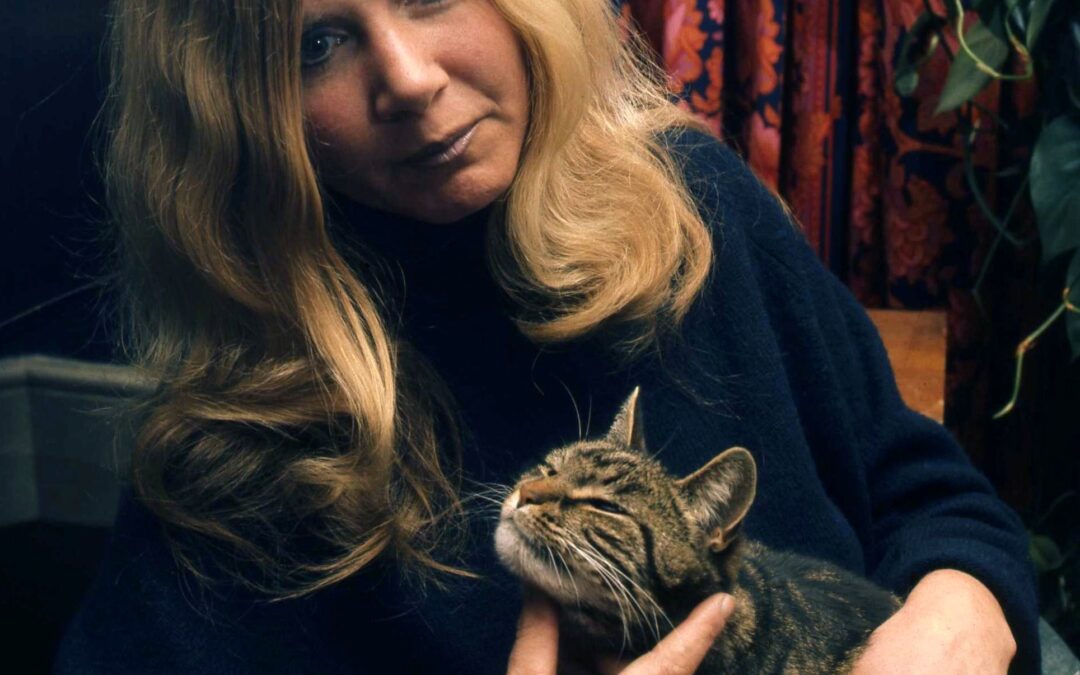By John Walsh
The news of Jilly Cooper’s death on 5 October was covered, in the 24 hours that followed, with the kind of comprehensive admiration usually reserved for a fondly-recalled member of royalty. Not only did every newspaper carry her image on its front page; it seemed every woman journalist in the UK crowded onto the inner pages to pay their tributes. They wrote about “Jilly” (never “Cooper”) as though she were a dear friend, not just the author of some amusing books; as the perfect lunch date and shopping companion, but also the ideal confidante and stalwart pal in times of pain.
I interviewed her for Books & Bookmen magazine in 1984, before she’d embarked on her first bonkbuster, Riders. The pretext for our meeting was The Common Years, a memoir of her life in the bosky London suburb of Putney, and her neighbours in Lower Richmond Road (of whom, coincidentally, I was one.)
I would, though, have seized any pretext to meet Jilly. I’d enjoyed reading her Sunday Times columns about London life; in one, she described a lunchtime foray into Soho strip clubs, and how she’d descend the mean stairways to confront the mortified clientele. I’d also admired her physical presence on television: her tumbling blonde locks, her merry eyes and slightly distraite manner. I liked the way she chortled, that fine portmanteau word coined by Lewis Carroll, meaning to chuckle and snort simultaneously.
So I took the train down to The Chantry, the lovely house in Gloucestershire she shared with her husband Leo Cooper, the publisher and military historian. Jilly sat in her favourite armchair while her beloved dogs, Fortnum and Maidstone, took up sentry positions on either side. She was wearing tight jeans and a ribbed cappuccino jumper, down which her hair tumbled and jostled whenever she turned her head. She laughed a lot, revealing an enchanting gap between her front teeth. I had a strong feeling that Chaucer’s much-married, also gap-toothed and phenomenally sexy Wife of Bath must have been very like Mrs Cooper.
We talked about the Common that we had in common, and she explained the reasons behind the names she’d given to certain landmarks. There was “Alimony Villas” (because at one time there were so many divorced women living there”) and “the Eternal Triangle” (“a three-sided parking space, so-called because so many lovers – usually adulterers who could meet only during the day – park their cars there during lunch-hour.” There was also, regrettably, “Lurkers’ Paradise”, “Flashers’ Point” and “Muggers’ Tunnel.”
The book charted Jilly’s encounters with local people she met on her daily dog-walks. Some were frustrated writers, among them a tramp called Old Dick, who lived in the park ranger’s hut. One day he presented Jilly with a bunch of roses and promised her a lovely surprise the following day. Next day he presented her with a brown-paper package that enclosed his autobiography; it was written in longhand in a scrapbook, hand-ruled in pencil. An accompanying note called her “the Goddess of the Common” and expressed his confidence that she could get it published. When, three days later, she broke the news that Old Dick seemed unlikely to get the go-ahead from Cape or Weidenfeld, the old man reacted “as though I’d just turned down Hamlet or The Iliad.” Out of kindness, she promised to try the masterpiece on friends who knew publishers. Days of embarrassment followed. Every time she walked the dogs, Old Dick popped up on the Common, to enquire about developments in London, while Jilly invented more and more outlandish white lies.
Jilly proved to be a terrific flirt – her breathy contralto was made for sotto voce confidences – and an 18-carat gossip. I stayed well past my allotted hour, revelling in her stories. Leo entered the room three times to see if I’d gone. The first time, he gave me a hard look. The second, he gazed meaningfully at his watch. The third, he actually tossed a British Rail timetable on the table beside me.
“Sorry,” I muttered, “I really must go and get my train.”
But Jilly always had time for more chat.
“What are you up to this evening?” she asked, as I put my tape recorders away.
“I’m going to the cinema to see The Company of Wolves,” I said. “How about you?”
“We’re going to dinner with Godfrey Smith,” she said, referring to the former editor of the Sunday Times Magazine and connoisseur of all things English. “Do you know Godfrey?”
“I’ve met him once or twice.”
“What do you think of him?”
“He’s sort of… Falstaff in a Garrick Club tie,” I said, “but very genial and charming. A real English gentleman.”
“He’s not a quite as innocent as people think,” said Jilly. “I sat beside him at a dinner party a couple of years ago and, after the first course, he turned to me and said, ‘So Jilly. Would you be interested to know what I was doing at five o’clock this morning?’ I said, ‘Actually I’d really rather not, Godfrey, but I can see that you’re dying to tell me.’ He said, ‘As a matter of fact, I was being sucked orf by the former winner of the Booker Prize .’ I didn’t hear the word ‘former’ so I thought, ‘My God, that’s — William Golding?’ But of course it wasn’t. It was Bernice Rubens!”
I rode home on the train comprehensively dazzled by Ms Cooper, but struggling to expunge from my brain the image conjured up by her final story.

